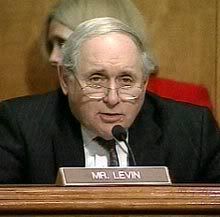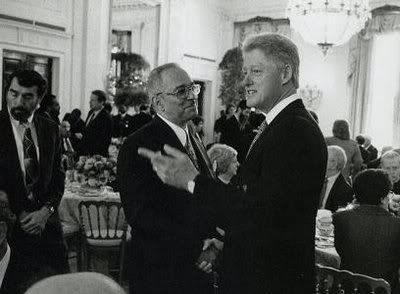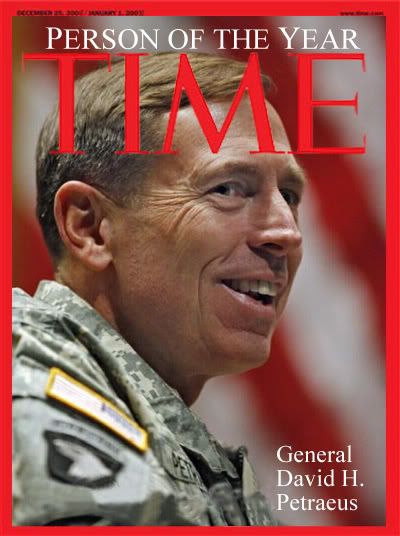Tuesday, September 30, 2008
DEMS WRONG (naturally) on FREDDIE/FANNIE
Freaking Brilliant!!! DEMS exposed.
More proof people vote DEM because their parents did, period
Friday, September 26, 2008
Mark Levin ROCKS!!!

Conservatives vs. Liberals
We keep hearing conservative, liberal. We keep hearing lectures about it and we should. But we really do need to understand the terms here. There’s a huge difference between conservatives and liberals.
You’re seeing it played out on television every night. With this detestable Carl Levin of Michigan with his spectacles at the end of his nose.

Somebody buy that man a pair of new glasses!
What is Conservatism? It’s not a political philosophy folks; it’s a life philosophy. Conservatives believe that each individual is unique. We believe that each individual is responsible for his development. We believe that family is the best support group for individuals. And we believe that private institutions like churches and synagogues, charities, private enterprises and so forth are best support group for families.
Conservatives believe, as did the Founders of the Declaration of Independence, that God is Supreme-not the government. Conservatives believe that God has given us natural rights, not the government.
Conservatives believe that a powerful centralized government such as ours, putting aside national security for the moment, threatens the individual, the family and private institutions. A powerful centralized government seeks uniformity and absolute compliance; it smothers individuality, family and religion. A centralized government seeks to play the role of God, through its abuse of laws and regulations, and the confiscation of redistribution of wealth.
Conservatives believe in the Constitution. We believe in Representative government as opposed to a judicial oligarchy or government by bureaucracy.

Conservatives believe in free political speech and the free exercise of religion. We believe in the right to bear arms. We believe in due process rights for American citizens and not terrorists. We believe in Federalism, the dispersing of power among the states. We believe in a colorblind society. We believe in low taxes and strictly limited spending. We believe in individual opportunity and merit.
Conservatives respect the private property and wealth of our fellow citizens. Just as it’s wrong for any of us to steal from our neighbors, it’s equally wrong to elect politicians who steal from our neighbors on our so-called behalf.
Conservatives believe in the greatness of the American people; their compassion; their honor; their inventiveness; their judgment. We believe that but for America, the world would be a dark, bloodthirsty, regressive place where tyranny would rule and humanity would suffer an unimaginable fate. And so we’re Conservatives. Proud conservatives.
Now what is Liberalism?
Liberals put a powerful centralized government before all else. Government exists to limit individual liberty, private property rights and religious freedom.
Liberals believe that the people are incapable of making the right decisions of their own so they empower undemocratic institutions to make decisions by fiat, such as the courts and federal agencies and the rest.
Liberals believe that Americans should be divided by color, by religion by sex and by income. Liberals seek to create jealousies among Americans and sic them upon each other in hopes of keeping them agitated and unfocused and distrustful and always wanting. And always a recipe for a more aggressive role for government.
Liberals are not satisfied with temporary power achieved through the
electoral process; they seek to create a permanent liberal agenda through the
courts, through the bureaucracy, through entitlements, through academia. They want an agenda immune from future electoral losses.

Liberals create entitlement programs, not because they solve anything, but because they don’t. They seek to enslave large portions of the population, they call them beneficiaries and they seek to punish private enterprise by forcing private citizens to pay up or suffer the consequences. Liberalism isn’t a way of life, its away of controlling life.
Liberals believe Americans are selfish, stupid and dishonorable. They believe that people exist to be manipulated and to serve the state for some greater good.
Liberals believe that America is not a unique place; that the Constitution is an obstacle to their power and that to create a world order in which they rule supreme, America’s independence must be destroyed through places like the UN and through policies like open borders. They detest the American culture and they seek to destroy it.
So, they worked for America’s defeat in Vietnam, just as they’re working
today, right now, to defeat us in Iraq.
A weak America is exactly what they seek. The elites want us to lose this war. You can hear them since the election. The detestable Carl Levin tried to undermine Reagan; hoped that we would lose the Cold War; hoped that we would lose the war with the Contras down in South America; hoped that we would lose the war wherever we fight it.
Kennedy, the single biggest figure in undermining our efforts in Vietnam, cutting off funding to the South Vietnamese, enslaving millions of people. Hundreds of thousands were murdered after we left South Vietnam, millions in Cambodia and the man never blinked, his conscience never panged, he never gave it a second thought.
They say they care about casualties in Iraq. They didn’t blink when Mao Tse-tung murdered 60 million people or when Stalin murdered over 20 million people, or when Pol Pot murdered 2.5 million people or when the Rwandans murdered 800 thousand, they didn’t blink and they won’t blink if we’re forced to leave Iraq, if we’re forced to lose that war and hundreds of thousands of people are slaughtered in the streets, with their blood running through the sewers they won’t blink again!
That’s what they think about humanity. The elites in our country, they don’t give a damn!
Power. Pursuit of power. The maintenance of power. That’s all they want.
You think I am wrong? Listen to them! Do they ever speak of victory? No! They tell us
victory is impossible.
Well, that’s not the country I grew up in. The country I grew up in defeated the Nazi’s. The country I grew up in defeated the Japanese in WW II. The country I grew up in can defeat any entity on the face of the earth. This is the country that fought a hugely bloody
Civil War to maintain the Union and eliminate slavery. A country that survived it.
This is a country against all odds that beat the British in the Revolutionary war. This is the country that won the Cold War despite the same liberals trying to obstruct our efforts then as they seek to obstruct our efforts today. You see the common thread?
They want us weak, they want us defeated, they want the open borders, they want to tear down our churches and our synagogues. They want to eliminate the very values and traditions and institutions that have made America unique, that have made America strong.
And why? For the greater good, of course! For the greater good, that’s how tyrants always come to power. You see they represent the very people they seek to enslave. At least they claim to. That’s what socialism and communism and liberalism is all about. Enslavement of one form or another. Anyone dares to speak up against them, they seek to destroy them. Even in our own country, they seek the political heads of one Conservative leader after another.
Whether it was Ronald Reagan, they wanted him. George Bush, less conservative, but too conservative for them. They want them eliminated.
Trent Lott, Newt Gingrich. If they had their way, and one day they might, they’d throw these people in prison without the benefit of a trial. After all, the only people who get due process in their minds are the terrorists, not the Republicans, the terrorists.
Ladies and gentlemen, some of you are extremely frustrated and upset. I share it, I understand. But we have an opportunity in this country, its an amazing thing, when the country is turned this way, Conservatism has always been the answer. Always been the answer. Liberty is the answer, that’s why Conservatism is the answer.

The rule of law is the answer. That’s Conservatism. National Security, that’s Conservatism. Merit, that’s conservatism.
That’s why most polls show an overwhelming majority of Americans 60-65% view themselves as Conservatives. Because, they are God fearing people who believe in Liberty, who believe in working hard, who believe in keeping most of what you earn, and who believe in their family and who believe in the military protecting us and the police officers watching our streets. That’s who we are and that’s what we believe in!
But, that’s not what the Liberals are and it’s not what they believe in.
I would encourage so-called conservative leaders to start explaining the differences. It’s been a long time since a national leader has done that. It’s been since Reagan. Let’s be blunt. Let’s be blunt. We must be blunt if we are to recover. And we can recover, ladies and gentlemen.
Nancy Pelosi is a boob. John Murtha is a boob. Harry Reid is a boob. THEY’RE ALL BOOBS! We’ve overcome much worse than these boobs.
But we will fail. We will fail if we follow false prophets. We will fail if we go the road of weasel Republicanism, ACLU Republicanism. Where they spent the whole damn summer worried about terrorists’ rights.
I blame John McCain on that. There’s no question about it! How silly was that? Well what will the world think? Who cares what the world thinks?
While their trains are being blown up, we’re defending ours. That’s their problem if they don’t like how we behave during war. And Europe is in no position to lecture us, given what they’ve done to humanity over the last hundred years. But, I digress.
What do we see on the agenda today? Today? Increase them minimum wage. That’s the number one agenda issue. Where did that come from?
Open borders, as I said the other night. So, we’re going to increase the minimum wage for American citizens and no minimum wage for illegal aliens. Gee, who’s going to get hired? Do you think?
Everywhere I look, I see Republicans acting like cowards. Everywhere I look, I see fear in their eyes. No, not in the grass roots, but in the elected politicians.
I need a commission to give me advice on what to do with Iraq. We don’t need a commission. We shouldn’t fight compassionate wars. We should use overwhelming force as fast as we can to destroy the enemy. Destroy the enemies’ families if we must. Mark, you’re so horrible. No.
That’s the FDR doctrine; the Truman doctrine; the Lincoln doctrine; the Washington doctrine. That’s how you fight war. That’s how you fight wars. And I didn’t even need a commission to tell you.
The elites want us to lose, so they want you to believe that this is the bloodiest war we’ve ever fought. You know that’s not true.

Every American life is precious. You’d better believe it. And we’ve lost less that three thousand in three, three and a half years in this war. In context, those casualties don’t come close to any other major war we’ve ever fought. Or for that matter, any other major battle we’ve ever had.
And as some of my audience know from my being on the radio several years now, my grandfather fought at Iwo Jima and Guam. My great uncle fought at Guadalcanal. They told me the horrible stories. Many of your relatives can tell you the same thing if not you yourself. You may have experienced it.
But a great nation must have the will to defeat this enemy. All the clutter with these phony diversionary arguments being raised by the left and the left’s mouthpieces in the media that we shouldn’t be in Iraq, that we should be somewhere else. Well, where else should we be? In Iran? No. In Syria? They tell us, no. In North Africa, Somalia? No. Well, where are we going to fight this enemy?
Iraq is the front lines. Somalia is the front lines. These are the front lines of the war.
If we don’t have the will to take out an enemy that struck the heart of America, then we will be doomed. That’s why we must win back these offices and take back power.
Tuesday, September 16, 2008
Obama's SHADOW DIPLOMACY
OBAMA TRIED TO STALL GIs IRAQ WITHDRAWAL

September 15, 2008
WHILE campaigning in public for a speedy withdrawal of US troops from Iraq, Sen. Barack Obama has tried in private to persuade Iraqi leaders to delay an agreement on a draw-down of the American military presence.
According to Iraqi Foreign Minister Hoshyar Zebari, Obama made his demand for delay a key theme of his discussions with Iraqi leaders in Baghdad in July.

"He asked why we were not prepared to delay an agreement until after the US elections and the formation of a new administration in Washington," Zebari said in an interview.
Obama insisted that Congress should be involved in negotiations on the status of US troops - and that it was in the interests of both sides not to have an agreement negotiated by the Bush administration in its "state of weakness and political confusion."
"However, as an Iraqi, I prefer to have a security agreement that regulates the activities of foreign troops, rather than keeping the matter open." Zebari says.
Though Obama claims the US presence is "illegal," he suddenly remembered that Americans troops were in Iraq within the legal framework of a UN mandate. His advice was that, rather than reach an accord with the "weakened Bush administration," Iraq should seek an extension of the UN mandate.
While in Iraq, Obama also tried to persuade the US commanders, including Gen. David Petraeus, to suggest a "realistic withdrawal date." They declined.
Obama has made many contradictory statements with regard to Iraq. His latest position is that US combat troops should be out by 2010. Yet his effort to delay an agreement would make that withdrawal deadline impossible to meet.
Supposing he wins, Obama's administration wouldn't be fully operational before February - and naming a new ambassador to Baghdad and forming a new negotiation team might take longer still.
By then, Iraq will be in the throes of its own campaign season. Judging by the past two elections, forming a new coalition government may then take three months. So the Iraqi negotiating team might not be in place until next June.
Then, judging by how long the current talks have taken, restarting the process from scratch would leave the two sides needing at least six months to come up with a draft accord. That puts us at May 2010 for when the draft might be submitted to the Iraqi parliament - which might well need another six months to pass it into law.
Prime Minister Nouri al-Maliki and the Bush administration have a more flexible timetable in mind.
According to Zebari, the envisaged time span is two or three years - departure in 2011 or 2012. That would let Iraq hold its next general election, the third since liberation, and resolve a number of domestic political issues.
Even then, the dates mentioned are only "notional," making the timing and the cadence of withdrawal conditional on realities on the ground as appreciated by both sides.
Iraqi leaders are divided over the US election. Iraqi President Jalal Talabani (whose party is a member of the Socialist International) sees Obama as "a man of the Left" - who, once elected, might change his opposition to Iraq's liberation. Indeed, say Talabani's advisers, a President Obama might be tempted to appropriate the victory that America has already won in Iraq by claiming that his intervention transformed failure into success.
Maliki's advisers have persuaded him that Obama will win - but the prime minister worries about the senator's "political debt to the anti-war lobby" - which is determined to transform Iraq into a disaster to prove that toppling Saddam Hussein was "the biggest strategic blunder in US history."
Other prominent Iraqi leaders, such as Vice President Adel Abdul-Mahdi and Kurdish regional President Massoud Barzani, believe that Sen. John McCain would show "a more realistic approach to Iraqi issues."
Obama has given Iraqis the impression that he doesn't want Iraq to appear anything like a success, let alone a victory, for America. The reason? He fears that the perception of US victory there might revive the Bush Doctrine of "pre-emptive" war - that is, removing a threat before it strikes at America.
Despite some usual equivocations on the subject, Obama rejects pre-emption as a legitimate form of self -defense. To be credible, his foreign-policy philosophy requires Iraq to be seen as a failure, a disaster, a quagmire, a pig with lipstick or any of the other apocalyptic adjectives used by the American defeat industry in the past five years.
Yet Iraq is doing much better than its friends hoped and its enemies feared. The UN mandate will be extended in December, and we may yet get an agreement on the status of forces before President Bush leaves the White House in January.
Sunday, September 14, 2008
Charles Krauthammer on Charles Gibson on Sarah Palin
It Was Gibson’s Gaffe
Which made the smug condescension all the more precious.
By Charles Krauthammer
“Ms. Palin most visibly stumbled when she was asked by Mr. Gibson if she
agreed with the Bush doctrine. Ms. Palin did not seem to know what
he was talking about. Mr. Gibson, sounding like an impatient teacher, informed
her that it meant the right of ‘anticipatory self-defense.’ ”
— New York Times, September 12
Informed her? Rubbish.The Times got it wrong. And Charlie Gibson got it wrong.
There is no single meaning of the Bush doctrine. In fact, there have been four distinct meanings, each one succeeding another over the eight years of this administration — and the one Charlie Gibson cited is not the one in common usage today.
He asked Palin, “Do you agree with the Bush doctrine?”
She responded, quite sensibly to a question that is ambiguous, “In what respect, Charlie?”
Sensing his “gotcha” moment, Gibson refused to tell her. After making her fish for the answer, he grudgingly explained to the moose-hunting rube that the Bush doctrine “is that we have the right of anticipatory self-defense.”
Wrong.
I know something about the subject because, as the Wikipedia entry on the Bush doctrine notes, I was the first to use the term. In the cover essay of the June 4, 2001, issue of The Weekly Standard titled, “The Bush Doctrine: ABM, Kyoto, and the New American Unilateralism,” I suggested that the Bush administration policies of unilaterally withdrawing from the ABM treaty and rejecting the Kyoto protocol, together with others, amounted to a radical change in foreign policy that should be called the Bush doctrine.
Then came 9/11, and that notion was immediately superseded by the advent of the war on terror. In his address to Congress nine days later, Bush declared: “Either you are with us, or you are with the terrorists. From this day forward, any nation that continues to harbor or support terrorism will be regarded by the United States as a hostile regime.” This “with us or against us” policy regarding terror — first deployed against Pakistan when Secretary of State Colin Powell gave President Musharraf that seven-point ultimatum to end support for the Taliban and support our attack on Afghanistan — became the essence of the Bush doctrine.
Until Iraq. A year later, when the Iraq War was looming, Bush offered his major justification by enunciating a doctrine of pre-emptive war. This is the one Charlie Gibson thinks is the Bush doctrine.
It’s not. It’s the third in a series and was superseded by the fourth and current definition of the Bush doctrine, the most sweeping formulation of Bush foreign policy and the one that most distinctively defines it: the idea that the fundamental mission of American foreign policy is to spread democracy throughout the world. It was most dramatically enunciated in Bush’s second inaugural address: “The survival of liberty in our land increasingly depends on the success of liberty in other lands. The best hope for peace in our world is the expansion of freedom in all the world.”
This declaration of a sweeping, universal American freedom agenda was consciously meant to echo John Kennedy’s pledge that the United States “shall pay any price, bear any burden . . . to assure the survival and the success of liberty.” It draws also from the Truman doctrine of March 1947 and from Wilson’s 14 points.
If I were in any public foreign-policy debate today, and my adversary were to raise the Bush doctrine, both I and the audience would assume — unless my interlocutor annotated the reference otherwise — that he was speaking about Bush’s grandly proclaimed (and widely attacked) freedom agenda.
Not the Gibson doctrine of pre-emption.
Not the “with us or against us” no-neutrality-is-permitted policy of the immediate post-9/11 days.
Not the unilateralism that characterized the pre-9/11 first year of the Bush administration.
Presidential doctrines are inherently malleable and difficult to define. The only fixed “doctrines” in American history are the Monroe and the Truman doctrines, which came out of single presidential statements during administrations where there were few conflicting foreign-policy crosscurrents.
Such is not the case with the Bush doctrine.
Yes, Palin didn’t know what it is. But neither does Gibson. And at least she didn’t pretend to know — while he looked down his nose and over his glasses with weary disdain, “sounding like an impatient teacher,” as the Times noted. In doing so, he captured perfectly the establishment snobbery and intellectual condescension that has characterized the chattering classes’ reaction to the phenom who presumes to play on their stage.
— Charles Krauthammer is a nationally syndicated columnist.
© 2008, The Washington Post Writers Group
The Palin "Interview"
It Was Gibson’s Gaffe
Which made the smug condescension all the more precious.
By Charles Krauthammer
“Ms. Palin most visibly stumbled when she was asked by Mr. Gibson if she
agreed with the Bush doctrine. Ms. Palin did not seem to know what
he was talking about. Mr. Gibson, sounding like an impatient teacher, informed
her that it meant the right of ‘anticipatory self-defense.’ ”
— New York Times, September 12
Informed her? Rubbish.The Times got it wrong. And Charlie Gibson got it wrong.
There is no single meaning of the Bush doctrine. In fact, there have been four distinct meanings, each one succeeding another over the eight years of this administration — and the one Charlie Gibson cited is not the one in common usage today.
He asked Palin, “Do you agree with the Bush doctrine?”
She responded, quite sensibly to a question that is ambiguous, “In what respect, Charlie?”
Sensing his “gotcha” moment, Gibson refused to tell her. After making her fish for the answer, he grudgingly explained to the moose-hunting rube that the Bush doctrine “is that we have the right of anticipatory self-defense.”
Wrong.
I know something about the subject because, as the Wikipedia entry on the Bush doctrine notes, I was the first to use the term. In the cover essay of the June 4, 2001, issue of The Weekly Standard titled, “The Bush Doctrine: ABM, Kyoto, and the New American Unilateralism,” I suggested that the Bush administration policies of unilaterally withdrawing from the ABM treaty and rejecting the Kyoto protocol, together with others, amounted to a radical change in foreign policy that should be called the Bush doctrine.
Then came 9/11, and that notion was immediately superseded by the advent of the war on terror. In his address to Congress nine days later, Bush declared: “Either you are with us, or you are with the terrorists. From this day forward, any nation that continues to harbor or support terrorism will be regarded by the United States as a hostile regime.” This “with us or against us” policy regarding terror — first deployed against Pakistan when Secretary of State Colin Powell gave President Musharraf that seven-point ultimatum to end support for the Taliban and support our attack on Afghanistan — became the essence of the Bush doctrine.
Until Iraq. A year later, when the Iraq War was looming, Bush offered his major justification by enunciating a doctrine of pre-emptive war. This is the one Charlie Gibson thinks is the Bush doctrine.
It’s not. It’s the third in a series and was superseded by the fourth and current definition of the Bush doctrine, the most sweeping formulation of Bush foreign policy and the one that most distinctively defines it: the idea that the fundamental mission of American foreign policy is to spread democracy throughout the world. It was most dramatically enunciated in Bush’s second inaugural address: “The survival of liberty in our land increasingly depends on the success of liberty in other lands. The best hope for peace in our world is the expansion of freedom in all the world.”
This declaration of a sweeping, universal American freedom agenda was consciously meant to echo John Kennedy’s pledge that the United States “shall pay any price, bear any burden . . . to assure the survival and the success of liberty.” It draws also from the Truman doctrine of March 1947 and from Wilson’s 14 points.
If I were in any public foreign-policy debate today, and my adversary were to raise the Bush doctrine, both I and the audience would assume — unless my interlocutor annotated the reference otherwise — that he was speaking about Bush’s grandly proclaimed (and widely attacked) freedom agenda.
Not the Gibson doctrine of pre-emption.
Not the “with us or against us” no-neutrality-is-permitted policy of the immediate post-9/11 days.
Not the unilateralism that characterized the pre-9/11 first year of the Bush administration.
Presidential doctrines are inherently malleable and difficult to define. The only fixed “doctrines” in American history are the Monroe and the Truman doctrines, which came out of single presidential statements during administrations where there were few conflicting foreign-policy crosscurrents.
Such is not the case with the Bush doctrine.
Yes, Palin didn’t know what it is. But neither does Gibson. And at least she didn’t pretend to know — while he looked down his nose and over his glasses with weary disdain, “sounding like an impatient teacher,” as the Times noted. In doing so, he captured perfectly the establishment snobbery and intellectual condescension that has characterized the chattering classes’ reaction to the phenom who presumes to play on their stage.
— Charles Krauthammer is a nationally syndicated columnist.
© 2008, The Washington Post Writers Group
McCain Photo "op"
September 12, 2008
How Jill Greenberg Really Feels About John McCain
When The Atlantic called Jill Greenberg, a committed Democrat, to shoot a portrait of John McCain for its October cover, she rubbed her hands with glee.
She delivered the image the magazine asked for—a shot that makes the Republican presidential nominee look heroic. Greenberg is well known for her highly retouched images of bears and crying babies. But she didn’t bother to do much retouching on her McCain images. “I left his eyes red and his skin looking bad,” she says.
 After getting that shot, Greenberg asked McCain to “please come over here” for one more set-up before the 15-minute shoot was over. There, she had a beauty dish with a modeling light set up. “That’s what he thought he was being lit by,” Greenberg says. “But that wasn’t firing.”
After getting that shot, Greenberg asked McCain to “please come over here” for one more set-up before the 15-minute shoot was over. There, she had a beauty dish with a modeling light set up. “That’s what he thought he was being lit by,” Greenberg says. “But that wasn’t firing.”
What was firing was a strobe positioned below him, which cast the horror movie shadows across his face and on the wall right behind him. “He had no idea he was being lit from below,” Greenberg says. And his handlers didn’t seem to notice it either. “I guess they’re not very sophisticated,” she adds.
 The Atlantic didn’t select the diabolical looking McCain for its cover. Greenberg is hoping to license that image to some other magazine (she negotiated a two-week embargo with The Atlantic so she could re-license images from the shoot before the election).
The Atlantic didn’t select the diabolical looking McCain for its cover. Greenberg is hoping to license that image to some other magazine (she negotiated a two-week embargo with The Atlantic so she could re-license images from the shoot before the election).
Warned that the image is just the kind of thing that will stir up the anti-media vitriol in the conservative blogosphere, Greenberg said, “Good. I want to stir stuff up, but not to the point where I get audited if he becomes president.”
That said, she goes on to explain that she’s thought about replacing McCain’s mouth with bloody shark teeth and displaying the image on a billboard with the message that the candidate is a bloodthirsty war monger.
Given her strong feelings about John McCain, we asked whether she had any reservations about taking the assignment in the first place.
“I didn’t,” she says. “It’s definitely exciting to shoot someone who is in the limelight like that. I am a pretty hard core Democrat. Some of my artwork has been pretty anti-Bush, so maybe it was somewhat irresponsible for them [The Atlantic] to hire me.”
Posted by David Walker on September 12, 2008 | Permalink | Comments (147) | TrackBack (0) 
TrackBack
TrackBack URL for this entry:
http://www.typepad.com/t/trackback/258746/33399020




